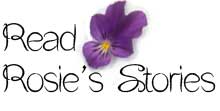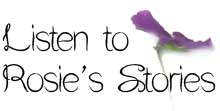Participation in storytelling develops listening and engagement skills so necessary in today’s fast-moving but non-reflective society:
- It encourages full communication skills in our increasingly oral culture. (e.g. in schools, businesses).
- It can encourage community or working groups to find a common place to work from and to bond.
- It can be used in reminiscence and trauma work, using the teller as mediator to encourage recall, form and self-expression.
- It can be used with the young to enrich the learning experience.
Storytelling develops listening skills; no listeners, no point in the telling: no listening, no story to tell.
“The best compliment-was 2 little boys-they were sitting at the front-when you said about the toy huntsmen they (twanged) their bows at each other. They wanted those toys, they were real to them” Maria Papadogianni
“Rosie is a very generous storyteller who fully gifts her stories to her audience- she never ‘holds’ on to it for herself. She connects with her audience with authenticity and humour and brings a deep awareness of the inner life of the story.”
Joanna Parsons
Storytelling and ballad singing are among the most ancient of human traditions. Our brains are hard-wired to learn about the world through narrative. Stories may be used to deliver messages, teach lifeskills and to reflect the emotional developmental journey. In days before widespread literacy, the ability to weave tales and remember details was highly valued. The oral tradition has been (and in areas of conflict still is) used to relate news, history and politics and help unify society.
There are many layers to storytelling. A true skill will bring the tale straight from heart to heart as well as eye to eye and mind to mind.
Stories are a neutral place where the listener can, safely and with support, explore issues, values, traumas and trials. They allow humour and emotion to lift our learning out of the mundane.
Many ancient tales persist because they engage with universal human values. The same tale can be heard in adapted form all around the world. Stories become tailored to their audience; going beyond entertainment into personalised sense. Less of a performance, more delivery of truth. Good storytellers do not preach, they present without judgement.
“I haven’t felt like that since I was 5”
“I really loved that story- did you really just make it up?”
“When you took us out and you were in costume and we visited places we see everyday- going to work or the shops but now when we see them-other things happened here- it makes it feel- different” Participants on a ghost walk



